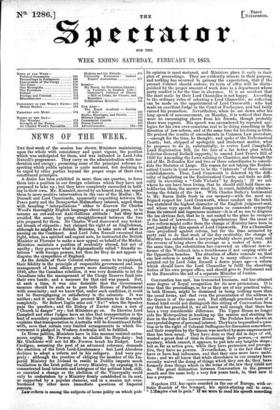Convocation has met, has transacted business, and has attained some
degree of Royal recognition for its new pretensions. It is true that the proceedings, so far as they are of any practical value in both Houses, might be dismissed as being nothing more than the usual forms, and that even the presentation of the address to the Queen is of the same sort. But although practical tests of a formal kind could not distinguish this sitting of Convocation from any that has preceded it, we all know well enough that there has been a vex,/ considerable difference. The Upper House no longer aids the Metropolitan in hushing up the session and shutting the door in the face of the Lower House. The Prelates have shown an unexpecteddegree of personal interest. They have bequeathed a ques- tion as to the right of Colonial Suffragans for discussion somewhere, and their reception by the Queen was marked by more empressement than has been usual. They have done as they did in days of old, wasted a great deal of time in discussing their powers,—a sacred mystery, which cannot, it appears, be put into any tangible shape ; but so far as action goes, while they have pretension and preroga- tive, they have no powers. Nevertheless, it is the fact that they have or have had influences, and that they once more have ambi- tions; and we all know that while churchmen in our country have recently waived the doing of things which they can do; they have formerly done things which in the letter of the law they could not do. The great distinction between Convocation in the present month and the same body a very few years back, is, that now it has a purpose.


























